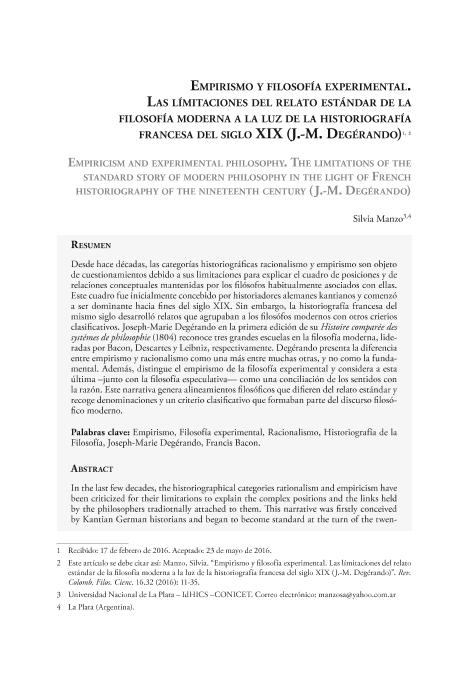Mostrar el registro sencillo del ítem
dc.contributor.author
Manzo, Silvia Alejandra

dc.date.available
2019-10-10T21:27:37Z
dc.date.issued
2016-08
dc.identifier.citation
Manzo, Silvia Alejandra; Empirismo y filosofía experimental: Las limitaciones del relato estándar de la filosofía moderna a la luz de la historiografía francesa del siglo XIX (J.-M. Degérando); Universidad del Bosque; Revista Colombiana de Filosofía de la Ciencia; 16; 32; 8-2016; 11-35
dc.identifier.issn
0124-4620
dc.identifier.uri
http://hdl.handle.net/11336/85648
dc.description.abstract
Desde hace décadas, las categorías historiográficas racionalismo y empirismo son objeto de cuestionamientos debido a sus limitaciones para explicar el cuadro de posiciones y de relaciones conceptuales mantenidas por los filósofos habitualmente asociados con ellas. Este cuadro fue inicialmente concebido por historiadores alemanes kantianos y comenzó a ser dominante hacia fines del siglo XIX. Sin embargo, la historiografía francesa del mismo siglo desarrolló relatos que agrupaban a los filosófos modernos con otros crierios clasificativos. Joseph-Marie Degérando en la primera edición de su Histoire comparée des systémes de philosophie (1804) reconoce tres grandes escuelas en la filosofía moderna, lideradas por Bacon, Descartes y Leibniz, respectivamente. Degérando presenta la diferencia entre empirismo y racionalismo como una más entre muchas otras, y no como la fundamental. Además, distingue el empirismo de la filosofía experimental y considera a esta última –junto con la filosofía especulativa— como una conciliación de los sentidos con la razón. Este narrativa genera alineamientos filosóficos que difieren del relato estándar y recoge denominaciones y un criterio clasificativo que formaban parte del discurso filosófico moderno.
dc.description.abstract
In the last few decades, the historiographical categories rationalism and empiricism have been criticized for their limitations to explain the complex positions and the links held by the philosophers tradiotnally attached to them. This narrative was firstly conceived by Kantian German historians and began to become standard at the turn of the twentieh century. Nonetheless, nineteenth-century French historiography developed other narratives by which early modern philosophers were classified according to alternative criteria. In the first edition of Histoire comparée des systémes de philosophie (1804), JosephMarie Degérando distinguishes three first-order early modern schools founded by Bacon, Descartes and Leibniz, respectively. Degérando introduces the empiricism and rationalism distinction as one among others, and not as the fundamental one. In addition, he separates empiricism from experimental philosophy. The last one, along with speculative philosophy, is said to conciliate senses and reason. As a result, this account offers philosophical groupings different from those constructed by the standard narrative. Furthermore, it draws on labels and classification criteria which were part of the early modern philosophical discourse.
dc.format
application/pdf
dc.language.iso
spa
dc.publisher
Universidad del Bosque
dc.rights
info:eu-repo/semantics/openAccess
dc.rights.uri
https://creativecommons.org/licenses/by-nc-nd/2.5/ar/
dc.subject
Filosofía Experimental
dc.subject
Empirismo
dc.subject
Racionalismo
dc.subject
Historiografía de la Filosofía
dc.subject
Joseph-Marie Degérando
dc.subject
Francis Bacon
dc.subject.classification
Filosofía, Historia y Filosofía de la Ciencia y la Tecnología

dc.subject.classification
Filosofía, Ética y Religión

dc.subject.classification
HUMANIDADES

dc.title
Empirismo y filosofía experimental: Las limitaciones del relato estándar de la filosofía moderna a la luz de la historiografía francesa del siglo XIX (J.-M. Degérando)
dc.title
Empiricism and experimental philosophy: The limitations of the standard story of modern philosophy in the light of French historiography of the nineteenth century ( J.-M. Degérando)
dc.type
info:eu-repo/semantics/article
dc.type
info:ar-repo/semantics/artículo
dc.type
info:eu-repo/semantics/publishedVersion
dc.date.updated
2019-09-23T17:30:32Z
dc.journal.volume
16
dc.journal.number
32
dc.journal.pagination
11-35
dc.journal.pais
Colombia

dc.journal.ciudad
Bogotá
dc.description.fil
Fil: Manzo, Silvia Alejandra. Consejo Nacional de Investigaciones Científicas y Técnicas. Centro Científico Tecnológico Conicet - La Plata. Instituto de Investigaciones en Humanidades y Ciencias Sociales. Universidad Nacional de La Plata. Facultad de Humanidades y Ciencias de la Educación. Instituto de Investigaciones en Humanidades y Ciencias Sociales; Argentina
dc.journal.title
Revista Colombiana de Filosofía de la Ciencia
dc.relation.alternativeid
info:eu-repo/semantics/altIdentifier/url/https://revistas.unbosque.edu.co/index.php/rcfc/article/view/1821
dc.relation.alternativeid
info:eu-repo/semantics/altIdentifier/doi/https://doi.org/10.18270/rcfc.v16i32.1821
Archivos asociados
